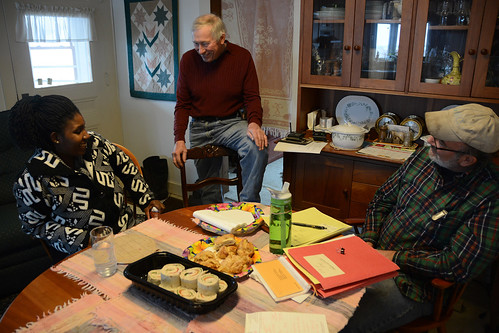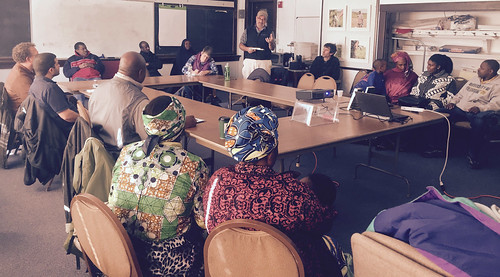
Rwanda native Janine Ndagijimana, her husband Faustine and their children moved to Burlington, Vermont in 2007 after living in a refugee camp in Tanzania for 13 years. Now a U.S. citizen, she works closely with Ben Waterman, the New American Farmer Program coordinator at the University of Vermont Extension Service (UVM) Center for Sustainable Agriculture. He manages the Land Access and Assessment Program that helps Vermont's resettled refugee and immigrant farmers obtain access to the resources they need to pursue their goals as farmers and to link common threads between their new home in America the culture of their homelands.
Janine was one of several farmers who recently attended a meeting of the Association of Africans Living in Vermont to learn about USDA programs and services. Farmers from Burundi, Rwanda, Somalia, and the Democratic Republic of Congo learned about land acquisition, insurance programs, loans to support farming, and technical and financial assistance for implementing conservation farming practices.
Waterman coordinates a project from USDA’s Outreach and Assistance for Socially Disadvantaged Farmers and Ranchers and Veteran Farmers and Ranchers Program (OASDVFR), administered through USDA’s Office of Advocacy and Outreach. The $43,000 grant is helping Vermont refugee farmers improve their understanding of programs and technical assistance available through UVM Extension and USDA agencies.
“We want to help these individuals, like Janine, build strong working relationships within the community and link them with the many resources that are available to them from the University and USDA,” said Waterman.
UVM Extension outreach includes two workshops with translators on-hand assisting refugee farmers as they learn more about the programs and services of USDA’s Farm Service Agency (FSA) and Natural Resources Conservation Service (NRCS). Farmers are then matched with an appropriate USDA representative to help them meet their individual goals and needs.
Many of the farmers are interested in the kinds of vegetables they grew up with and raised in their home countries, like “intore,” a variety of eggplant found in Africa that Janine grows. Of course, the climate in Vermont is very different from that of Africa, where eggplants could be harvested through January.
Thanks to technical and financial assistance through the NRCS Environmental Quality Incentives Program (EQIP), Janine will be able to extend her growing season in Vermont using a high tunnel. High tunnels, also known as hoop houses, are structures used to extend the growing season by shielding tender, sensitive crops—including vegetables, herbs, berries and others—from weather variations in the spring and fall, allowing them to grow where they might otherwise struggle.
With the assistance and mentorship of local farmer Gene Button, Janine is leasing land to raise her eggplants and market them locally and across the border in Canada. NRCS Soil Conservationist Danny Peet is also helping her use cover crops to improve soil health.
“The high tunnel allows production from mid-summer until later in the fall,” said Peet. He assisted Janine with the process of submitting the EQIP application, securing the lease for the acreage and locating the appropriate area to construct the high tunnel.
It can be a challenge to provide outreach and education to farmers for whom English is a second language. To help address this, another goal of the grant is to educate farmers through instructional videos in several languages. The first up provides an Introduction to USDA Programs for New American Farmers featuring USDA staff.
“A realistic outcome for the outreach meetings and the video is relationship building.” Waterman said. “Translation is key.”
Farmers can view the English and Kirundi versions of the video and Nepali and Maay Maay versions are in production. The educational and technical assistance content is designed to address barriers that resettled refugee farmers commonly face.
Water said, “It has been a pleasure and an honor to work with the farmers who bring their diverse culture, unique skill sets and such a rich agricultural heritage to the United States. They have tremendous potential and it is wonderful to see USDA in Vermont making a special effort to reach out to the farmers and improve access to programs and services.”

